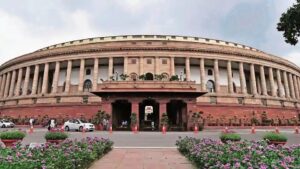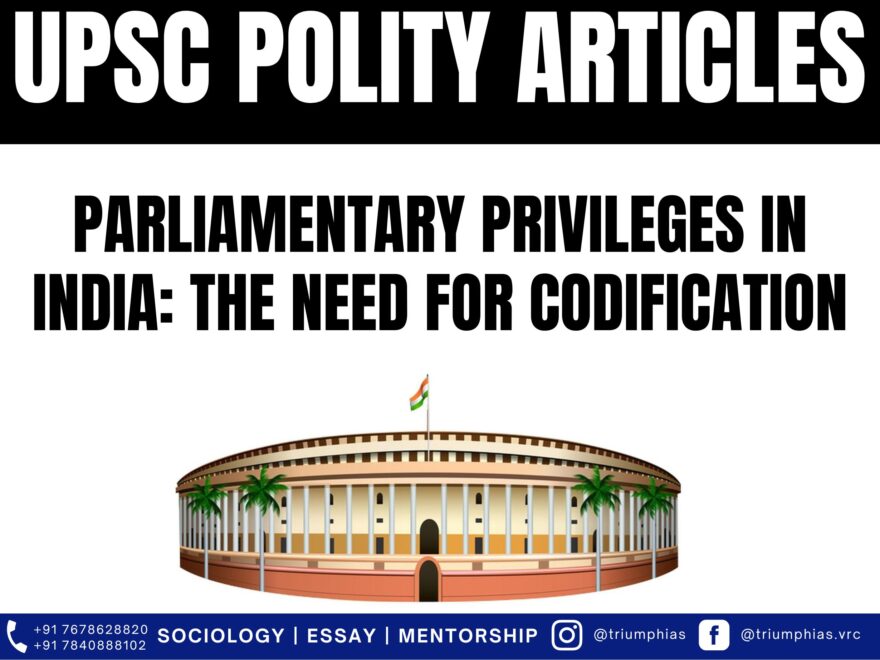Parliamentary Privileges
(Relevant for Polity Section of General Studies Paper Prelims/Mains)

Parliamentary Privileges
Privileges refer to distinct entitlements, immunities, or exemptions granted to the members of both houses of parliament and their respective committees. In the Indian Constitution, Article 105 addresses the authority and privileges extended to the Houses of Parliament, their members, and committees, while Article 194 mirrors this provision for State legislatures.
Constitutional privileges
- Article 105 – Pertains to the powers, privileges, etc, of Parliament, its members and committees.
- Article 194 – Protects the privileges and powers of the houses of legislature, their members and committees in the states.
Collective Privileges
- The ability to publish reports, debates, and proceedings, as well as the ability to prevent others from doing so.
- It can publish truthful reports of Parliamentary proceedings without the House’s authorization under the freedom of the press.
- However, in the case of a House meeting held in secret, this right of the press does not apply
- Keep strangers out of the gathering and organise covert sessions to address vital issues.
- Make rules to govern its own procedure and commercial activity, as well as to adjudicate on such issues.
- Right to immediate notification of a member’s arrest, custody, conviction, imprisonment, and release
- Initiate inquiries and compel a person’s attendance
- The courts are not allowed to investigate a House’s or its committees’ proceedings
- Without the consent of the Presiding officer, no one (whether a member or an outsider) can be arrested, and no legal process (civil or criminal) can be served within the House’s boundaries.
Individual Privileges
- During the session of legislature, from 40 days before the beginning to 40 days after the finish, no member may be arrested.
- This privilege is only granted in civil matters; it is not granted in criminal or preventive detention situations
- Members have the right to free expression.
- No member of Parliament or its committees is accountable in any court for anything said or voted in Parliament or its committees.
- This independence is limited by the Constitution’s provisions as well as the norms and standing orders that govern Parliament’s functioning.
- They have the right to decline to give evidence and testify in court.
The conflict between privileges:
The Constitution of India chose not to explicitly define these privileges but rather equated them with those enjoyed by the House of Commons in the United Kingdom. This wholesale adoption of the uncodified privileges of the British House of Commons by the Indian Parliament, which operates under written Constitution guaranteeing fundamental rights such as freedom of speech and expression, has recently led to conflicts between the legislature and the press, as well as the judiciary.
Instances of Misuse:
The absence of a codified framework for privileges creates confusion and can potentially infringe upon the freedom of speech and expression. In 2017, two senior journalists from Kannada tabloids were imprisoned for violating the privileges of the state assembly. Other instances, such as the Blitz case (1951), the Searchlight case (1959), Keshav Singh case, and The Hindu case (2003), have seen privileges guaranteed to parliamentarians leading to unnecessary legal issues and the prosecution of media personnel and individuals.
Despite the potential for misuse and the conflict with democratic rights, resistance to codifying these privileges persists because codification would subject them to fundamental rights and, consequently, judicial review. It would also limit the evolution of new privileges.
These privileges were initially adopted from the practices of the British Parliament, which has moved away from considering acts and statements defamatory to Parliament or its members as privilege matters. In 1987, Australia codified privileges. Even the Constitution Review Commission, led by Justice M.N. Venkatachaliah, recommended defining and limiting privileges to ensure the independent functioning of legislatures. Therefore, the Indian Parliament should consider the gradual codification of these privileges.
Sample Question for UPSC Sociology Optional Paper:
1. What is the Constitutional basis for parliamentary privileges in India?
- Answer: The Constitutional basis for parliamentary privileges in India is found in Article 105 for Parliament and Article 194 for State Legislatures.
2. Explain the two categories of privileges extended to members of the Indian Parliament.
- Answer: The two categories are Collective Privileges, which apply to the functioning of the House as a whole, and Individual Privileges, which protect the rights of individual members.
3. How do parliamentary privileges in India differ from those in the UK?
- Answer: Unlike the UK, which has an unwritten constitution, India’s parliamentary privileges are partially documented but largely remain uncodified, causing potential conflicts with fundamental rights enshrined in a written constitution.
4. Discuss one instance where parliamentary privilege was misused in India.
- Answer: In 2017, two senior journalists from Kannada tabloids were imprisoned for allegedly violating the privileges of the Karnataka state assembly.
5. Why is there resistance to codifying parliamentary privileges in India?
- Answer: Resistance exists because codification would subject these privileges to judicial review and may limit their evolution over time.
6. What are the implications of not codifying parliamentary privileges in India?
- Answer: The absence of codification can lead to arbitrary interpretations, potential misuse, and conflicts with other democratic institutions like the judiciary and the press.
7. How do parliamentary privileges impact freedom of the press in India?
- Answer: Parliamentary privileges can limit the freedom of the press, especially when reporting on secret House meetings, and can even result in legal actions against journalists.
8. What was the recommendation of the Constitution Review Commission regarding parliamentary privileges?
- Answer: The Constitution Review Commission, led by Justice M.N. Venkatachaliah, recommended defining and limiting privileges to ensure the independent functioning of legislatures.
9. What is the role of the Presiding Officer in the context of parliamentary privileges?
- Answer: The Presiding Officer has the authority to grant or withhold consent for the arrest or serving of legal processes within the House’s premises.
10. How do individual privileges safeguard the rights of parliamentarians?
- Answer: Individual privileges, like immunity from arrest in civil cases during the legislative session and the right to free expression within the House, protect members from undue interference in their parliamentary duties.
To master these intricacies and fare well in the Sociology Optional Syllabus, aspiring sociologists might benefit from guidance by the Best Sociology Optional Teacher and participation in the Best Sociology Optional Coaching. These avenues provide comprehensive assistance, ensuring a solid understanding of sociology’s diverse methodologies and techniques.
Parliamentary Privileges, Indian Constitution, Article 105, Article 194, Collective Privileges, Individual Privileges, Judiciary, Press, Democratic Rights, Codification, Freedom of Speech, Kannada Tabloids, Keshav Singh Case, The Hindu Case, House of Commons

Choose The Best Sociology Optional Teacher for IAS Preparation?
At the beginning of the journey for Civil Services Examination preparation, many students face a pivotal decision – selecting their optional subject. Questions such as “which optional subject is the best?” and “which optional subject is the most scoring?” frequently come to mind. Choosing the right optional subject, like choosing the best sociology optional teacher, is a subjective yet vital step that requires a thoughtful decision based on facts. A misstep in this crucial decision can indeed prove disastrous.
Ever since the exam pattern was revamped in 2013, the UPSC has eliminated the need for a second optional subject. Now, candidates have to choose only one optional subject for the UPSC Mains, which has two papers of 250 marks each. One of the compelling choices for many has been the sociology optional. However, it’s strongly advised to decide on your optional subject for mains well ahead of time to get sufficient time to complete the syllabus. After all, most students score similarly in General Studies Papers; it’s the score in the optional subject & essay that contributes significantly to the final selection.
“A sound strategy does not rely solely on the popular
Opinion of toppers or famous YouTubers cum teachers.”
It requires understanding one’s ability, interest, and the relevance of the subject, not just for the exam but also for life in general. Hence, when selecting the best sociology teacher, one must consider the usefulness of sociology optional coaching in General Studies, Essay, and Personality Test.
The choice of the optional subject should be based on objective criteria, such as the nature, scope, and size of the syllabus, uniformity and stability in the question pattern, relevance of the syllabic content in daily life in society, and the availability of study material and guidance. For example, choosing the best sociology optional coaching can ensure access to top-quality study materials and experienced teachers. Always remember, the approach of the UPSC optional subject differs from your academic studies of subjects. Therefore, before settling for sociology optional, you need to analyze the syllabus, previous years’ pattern, subject requirements (be it ideal, visionary, numerical, conceptual theoretical), and your comfort level with the subject.
This decision marks a critical point in your UPSC – CSE journey, potentially determining your success in a career in IAS/Civil Services. Therefore, it’s crucial to choose wisely, whether it’s the optional subject or the best sociology optional teacher. Always base your decision on accurate facts, and never let your emotional biases guide your choices. After all, the search for the best sociology optional coaching is about finding the perfect fit for your unique academic needs and aspirations.
To master these intricacies and fare well in the Sociology Optional Syllabus, aspiring sociologists might benefit from guidance by the Best Sociology Optional Teacher and participation in the Best Sociology Optional Coaching. These avenues provide comprehensive assistance, ensuring a solid understanding of sociology’s diverse methodologies and techniques. Sociology, Social theory, Best Sociology Optional Teacher, Best Sociology Optional Coaching, Sociology Optional Syllabus.
Best Sociology Optional Teacher, Sociology Syllabus, Sociology Optional, Sociology Optional Coaching, Best Sociology Optional Coaching, Best Sociology Teacher, Sociology Course, Sociology Teacher, Sociology Foundation, Sociology Foundation Course, Sociology Optional UPSC, Sociology for IAS,
Follow us :
🔎 https://www.instagram.com/triumphias
🔎https://www.youtube.com/c/TriumphIAS
https://t.me/VikashRanjanSociology
Find More Blogs
|
Scope of the subject and comparison with other social sciences |
|||
|
|
|
|
Modernity and social changes in Europe |


One comment